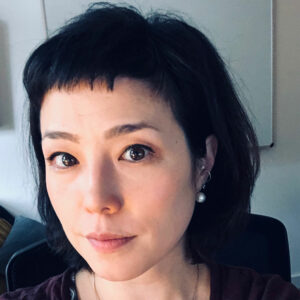Biography
Andrea E. Martin is a Principal Investigator at the Donders Centre for Cognitive Neuroimaging at Radboud University, and a Research Group Leader at the Max Planck Institute for Psycholinguistics. She grew up in California and Massachusetts. She received a BA in Cognitive Science from Hampshire College in Amherst, Massachusetts (2004), and an MA (2006) and PhD in Experimental Psychology (2010) from New York University. She was a postdoc at the Basque Centre on Cognition, Brain, and Language (2010-2012), a lecturer/assistant professor in Psychology at The University of Edinburgh (2012-2017), and a senior investigator in the Psychology of Language Department at the MPI for Psycholinguistics (2016-2018). She has led two independent research groups, one at the University of Edinburgh funded by the ESRC (2012-2017) and the other funded by the Netherlands Organization for Scientific Research and the Max Planck Gesellschaft. Her website is www.andreaemartin.com; twitter @andrea_e_martin.
Education and positions held
Education
- 2010
- PhD Experimental Psychology, New York University, New York, NY, USA
Thesis: Memory operations and structures in sentence comprehension: Evidence from ellipsis
Supervisor: Professor Brian McElree; Committee: Professors Greg Murphy, Liina Pylkkänen, Bob Rehder, Gary Marcus
- PhD Experimental Psychology, New York University, New York, NY, USA
- 2006
- MA General Psychology, New York University, New York, NY, USA
- 2004
- BA Cognitive Science, Hampshire College, Amherst, MA, USA
Thesis: The role of semantic verb type in syntactic ambiguity: An ERP investigation
- BA Cognitive Science, Hampshire College, Amherst, MA, USA
- 1999 – 2000
- Columbia University, New York, NY, USA
- 1997 – 1999
- Massachusetts Academy of Math and Science, Worcester, MA, USA
Positions
- 2020 – Present
- Max Planck Research Group Leader
Language and Computation in Neural Systems Group
Max Planck Institute for Psycholinguistics
Nijmegen, The Netherlands
- Max Planck Research Group Leader
- 2019 – present
- Principal Investigator
Language and Computation in Neural Systems Group
Donders Centre for Cognitive Neuroimaging, Radboud University
Nijmegen, The Netherlands
- Principal Investigator
Work Experience
- 2018 – 2019
- Senior Investigator
Psychology of Language Department (Prof. dr. Antje Meyer)
Max Planck Institute for Psycholinguistics
Nijmegen, The Netherlands
- Senior Investigator
- 2016 – 2018
- Staff Scientist
Psychology of Language Department (Prof. dr. Antje Meyer)
Max Planck Institute for Psycholinguistics
Nijmegen, The Netherlands
- Staff Scientist
- 2012 – 2017
- Lecturer in Psychology with tenure (US Assistant Professor)
School of Philosophy, Psychology and Language Sciences (PPLS)
University of Edinburgh, Edinburgh, Scotland, UK
(one year of maternity leave in 2014)
- Lecturer in Psychology with tenure (US Assistant Professor)
- 2010 – 2012
- Postdoctoral Researcher at Basque Center on Cognition, Brain, and Language (BCBL), Donostia-San Sebastián, Spain
Research Summary
We, and our brains, exemplify a paradoxical capacity when we produce and understand language. We are sensitive to exquisite statistical detail (e.g., how a particular speaker or signer produces a vowel) yet we have deep, unchanging knowledge of grammar (e.g., we create new words ad infinitum, but we don’t develop new grammatical rules on the fly). Although we might learn a word in a sentence context, or might experience that word more often in certain contexts, we are in no way limited to recognizing or using the word only in that context. While this capacity may seem pedestrian to us, it sets language apart from other perception-action systems, from artificial intelligence systems, and it makes language behavior vexingly difficult to account for from a neuroscientist’s and computationalist’s point of view. How do neural systems represent abstract symbolic knowledge while also being driven by statistical and associative processing mechanisms? The Language and Computation in Neural Systems group focuses on developing a model of language representation and processing that harnesses the computational power of neural oscillations, such that formal properties (viz., compositionality) can be realized in biological and artificial neural networks. In addition to these scientific foci, we are interested in how modelling can propagate theory-building in cognitive science and cognitive neuroscience, and in open science catalyzing inclusion, diversity, and decolonization in science.
Key publications
- Guest, O., & Martin, A. E. (2020). How computational modeling can force theory building in psychological science. https://doi.org/10.31234/osf.io/rybh9
- Martin, A. E. (2020). A compositional neural architecture for language. Journal of Cognitive Neuroscience, 1-20. https://doi.org/10.1162/jocn_a_01552
- Martin, A. E., & Doumas, L. A. (2019). Predicate learning in neural systems: using oscillations to discover latent structure. Current Opinion in Behavioral Sciences, 29, 77-83. https://doi.org/10.1016/j.cobeha.2019.04.008
- Martin, A. E., & Doumas, L. A. (2017). A mechanism for the cortical computation of hierarchical linguistic structure. PLoS Biology, 15(3). https://dx.doi.org/10.1371%2Fjournal.pbio.2000663
- Martin, A. E. (2016). Language processing as cue integration: Grounding the psychology of language in perception and neurophysiology. Frontiers in psychology, 7, 120. https://doi.org/10.3389/fpsyg.2016.00120

